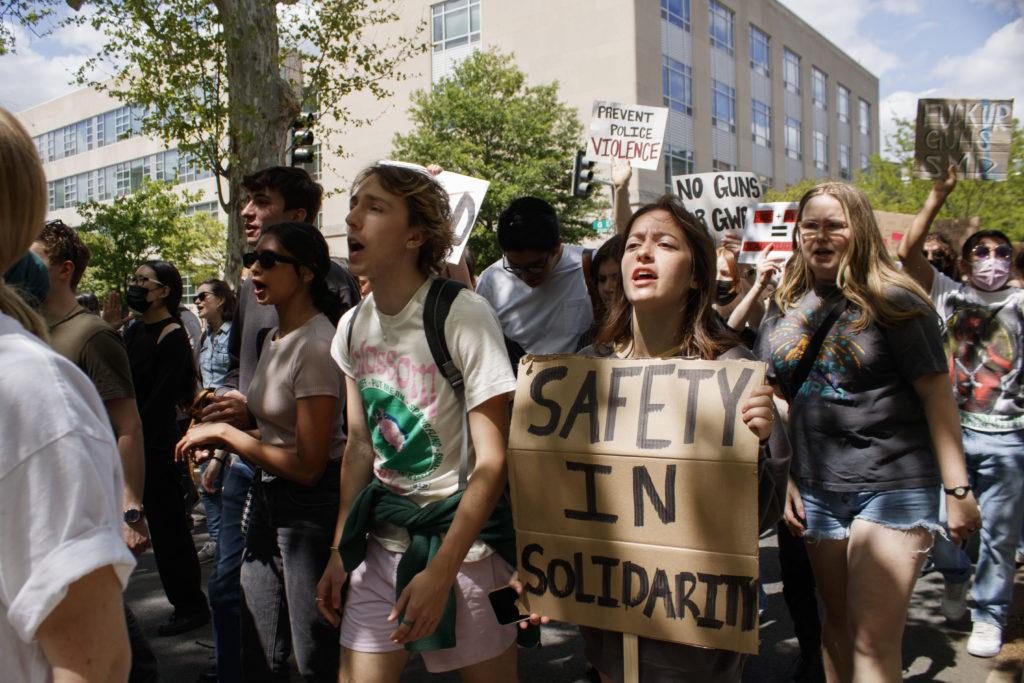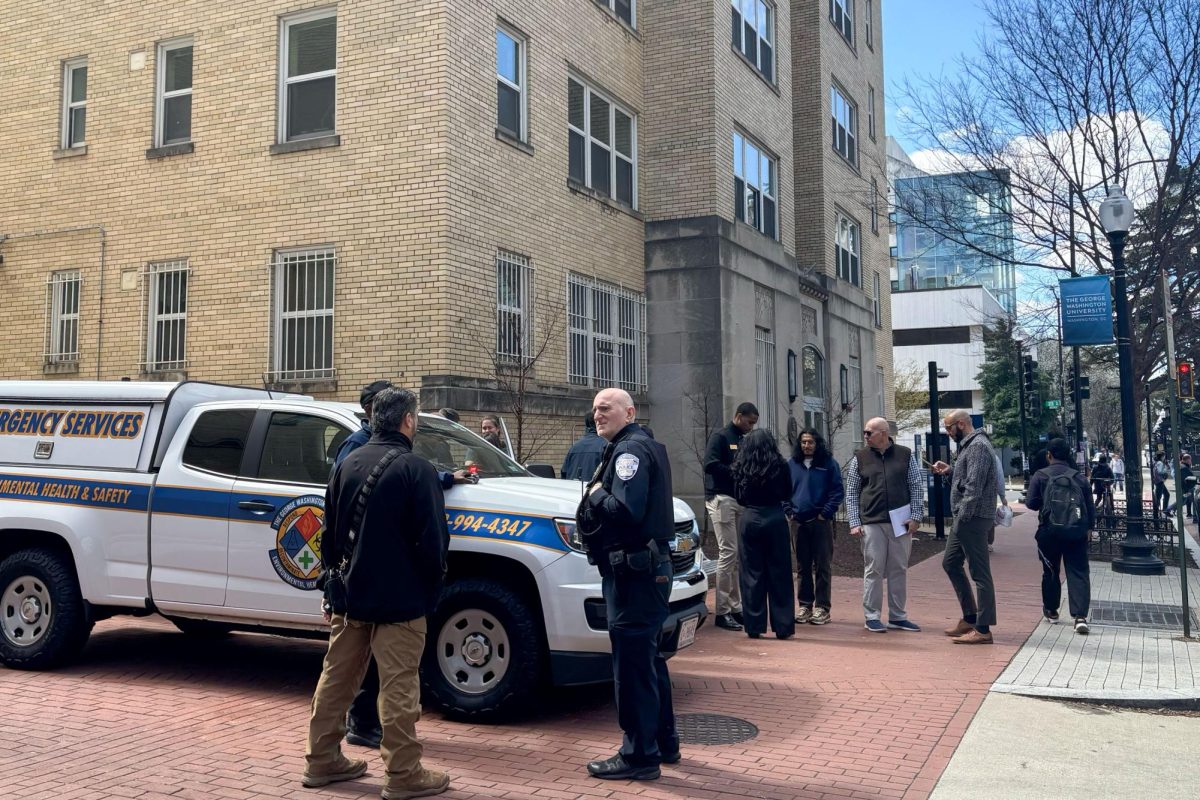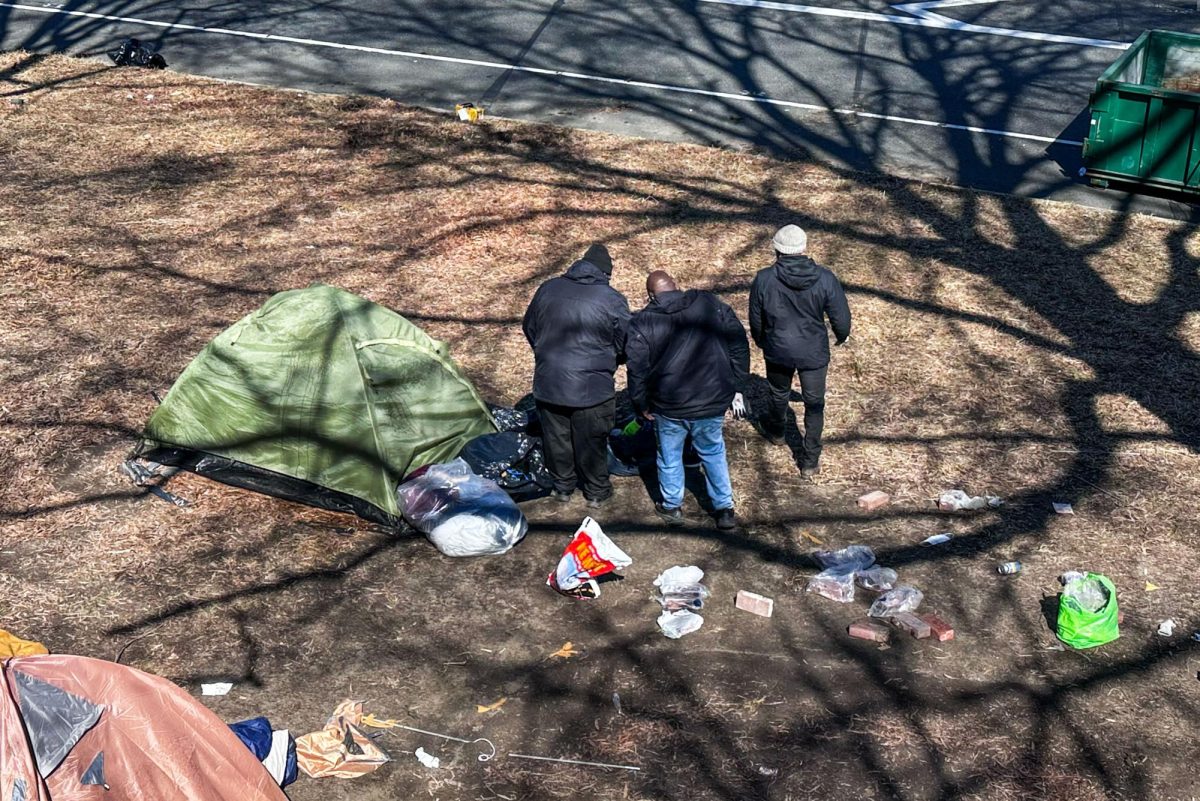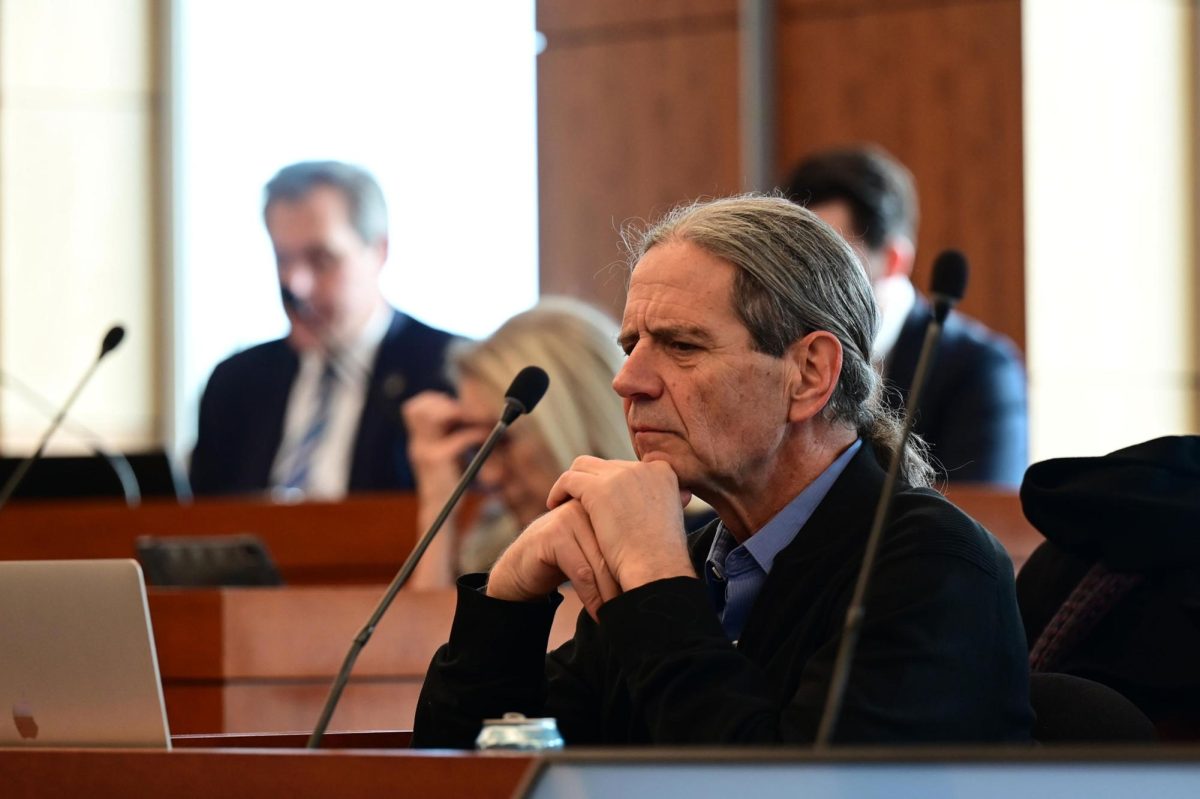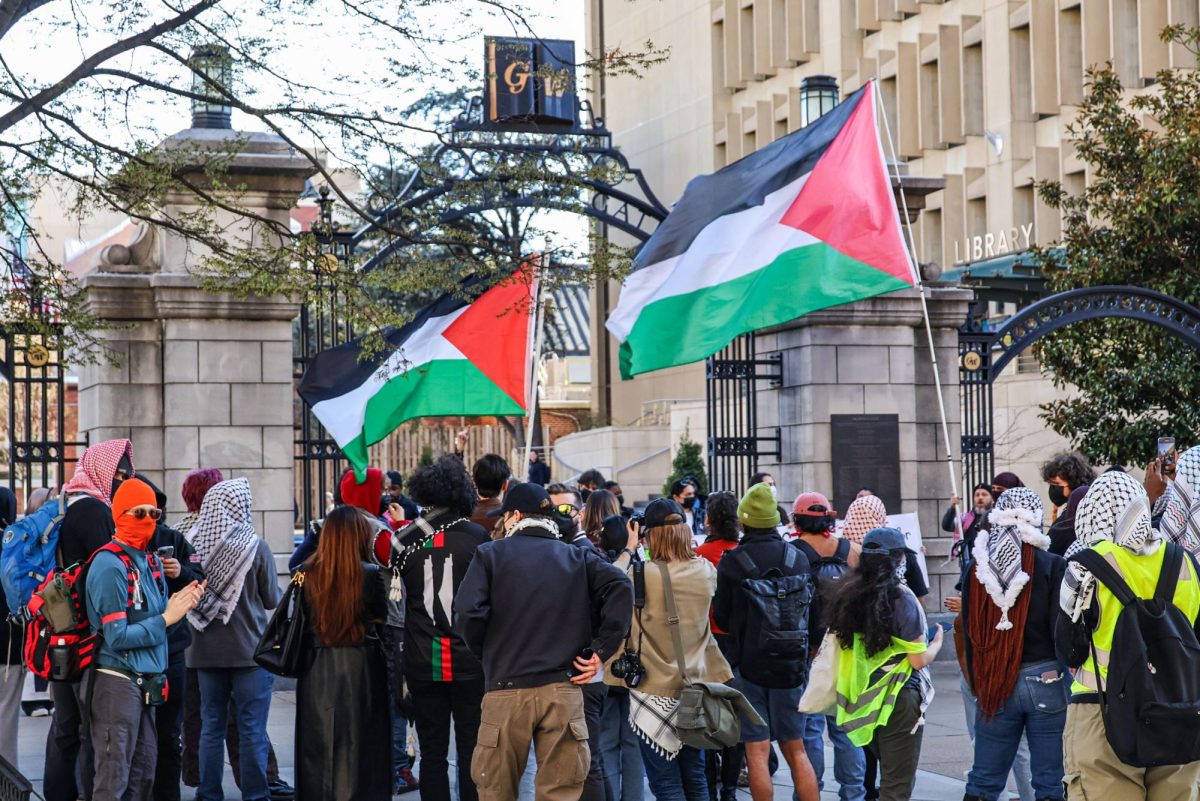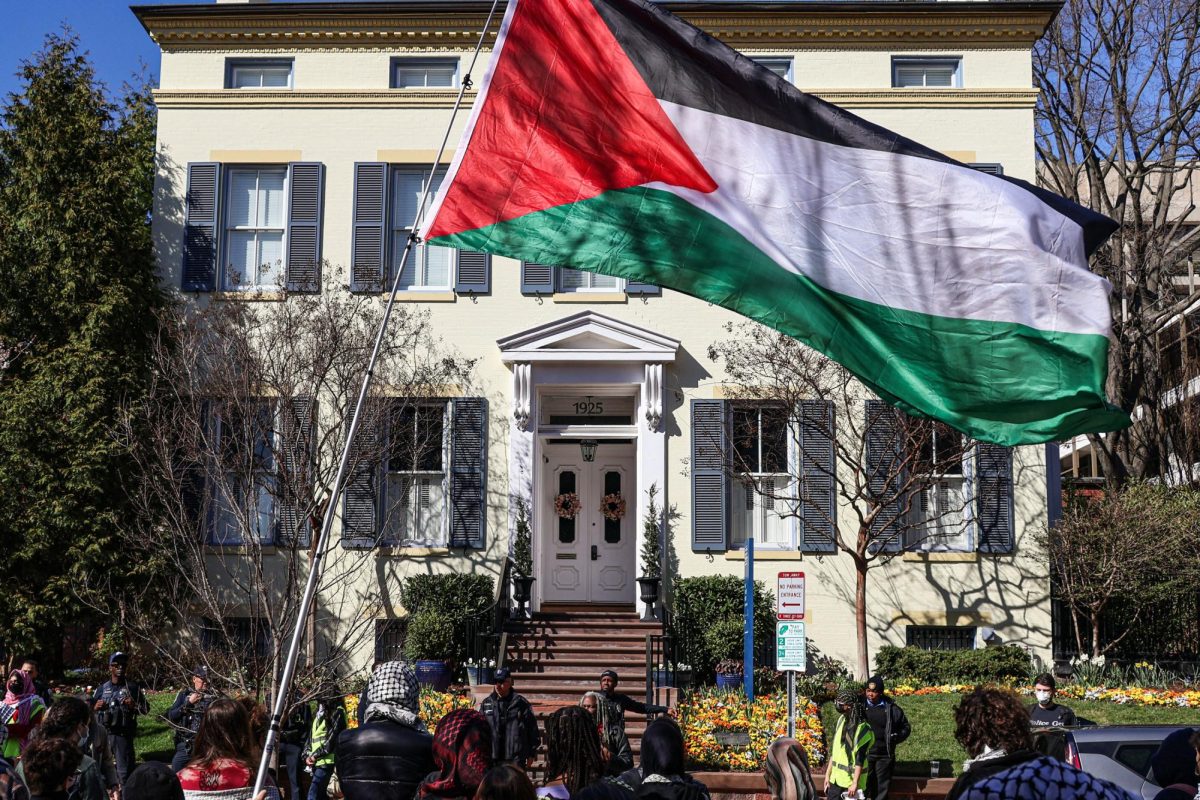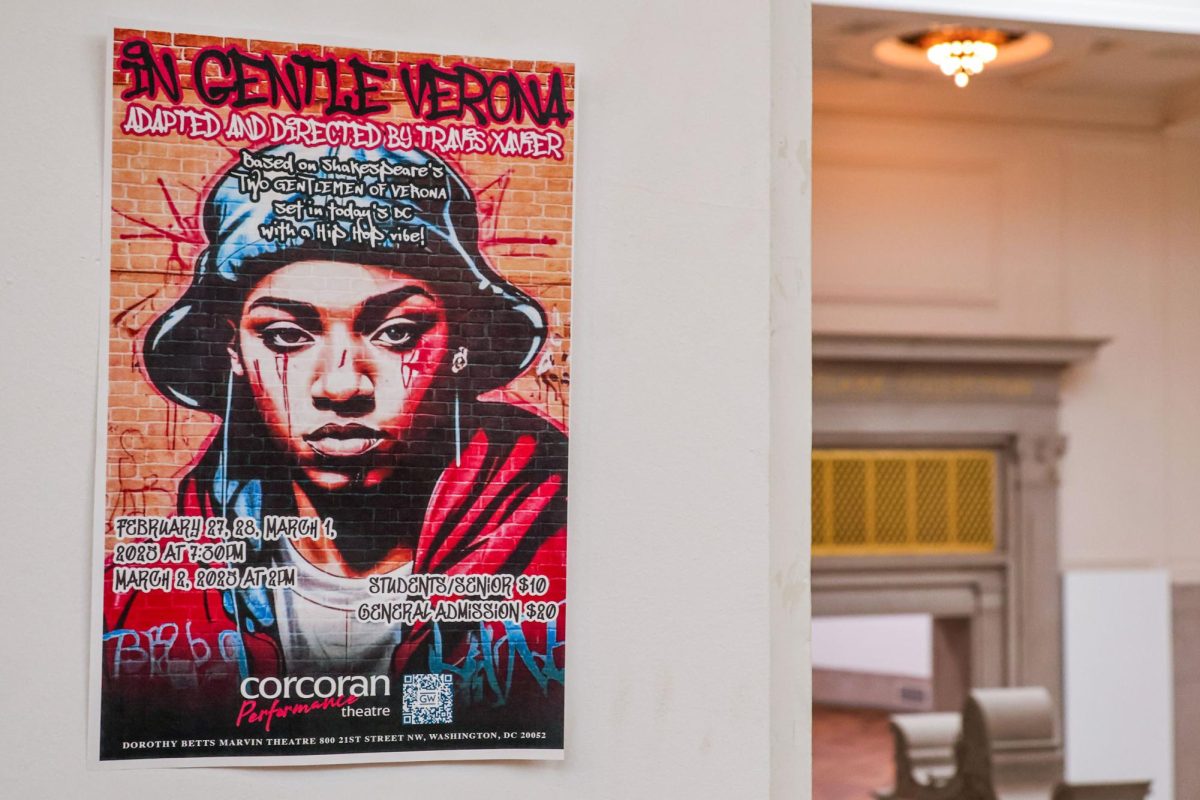At least 150 students marched from Kogan Plaza to the on-campus residence of interim University President Mark Wrighton Monday to denounce the Board of Trustees’ decision to arm some GW Police Department officers next fall.
Protesters from about 20 student organizations gathered in Kogan Plaza at 1 p.m. before they marched to F Street House while chanting, drumming and waving signs after Wrighton announced the Board’s plans Thursday to arm about 20 “specially trained” officers with with 9 mm handguns by the fall. Students at the march called on the Board to reverse its decision and said arming officers could risk police violence against students on campus and disproportionately threaten the safety of students of color.
The decision to arm GWPD officers has sparked backlash from students and faculty, who have bashed officials for failing to gather their input before the announcement. Among the crowd of students marching through campus, student organizations leading the charge included Sunrise GW, GW Dissenters, GW Black Defiance, Students for Justice in Palestine at GWU, Jewish Voice for Peace at GWU and Students Against Imperialism.
Protesters chanted “No justice, no peace, no racist police” and “We keep us safe” as they pounded drums and hoisted signs with messages reading “Guns off my campus” and “Disarm GWPD” during their hourlong protest through campus. With food, water and medical supplies in hand, protest organizers handed out pamphlets directing students to a petition for GW to reverse its commitment to arm GWPD officers. The petition has amassed more than 540 signatures as of Monday night.
“Our administration and institution has chosen to support the weaponization of our on-campus police force, and that’s unacceptable to me,” junior Vidya Muthupillai said at the rally.
In an email to the GW community Thursday, Wrighton said GWPD officers who are armed can better respond to emergencies in the University’s “densely populated setting.” He said the Board decision came in response to rising acts of gun violence, including recent shootings at the University of Virginia and Michigan State University this academic year.
“You see in the news, sadly, virtually every day, violence that stems from the use of guns,” Wrighton said in an interview. “We know that this is a huge problem. I’ve seen educational institutions, including higher education institutions, very seriously affected.”
But students argue the solution to threats of gun violence should not be more firearms on campus.
“This undemocratic decision was justified in the email by mass shootings on college campuses,” a speaker from Students Against Imperialism said at the rally in Kogan Plaza. “This reasoning, for lack of better words, is bullsh*t.”
D.C. contains 547 police officers per 100,000 people, the highest rate of police per capita of any U.S. city with a population above 250,000, according to WUSA9.
Freshman Chloe Blackburn said she was motivated to join the protest as an Afro-Latina because of continued gun violence toward people of color. A white man was charged Monday with shooting and seriously injuring 16-year-old Ralph Yarl, who is Black, after he rang the doorbell of the wrong house in Kansas City. Yarl’s attorneys said the act of violence stemmed from racial profiling.
Blackburn said she fears that arming GWPD officers will increase police violence against students of color.
“I really do hope that they put a ginormous pause in this operation and not arm GW police,” Blackburn said.
Everytown for Gun Safety – an organization advocating against gun violence – reported that 96 percent of police-involved killings of civilians involve firearms, and police are three times more likely to shoot and kill Black people than white people. Gunfire on college campuses has killed 94 people and injured 215 since 2013, according to Everytown data.
Freshman Neha Darisi, a member of GW Dissenters, said the Board’s decision to arm GWPD officers will not help “public safety” and instead will disproportionately harm students of color.
“GWPD is a reflection of the violence against minority communities being normalized and justified under the guise of public safety,” Darisi said.
More than three years after a GWPD officer appeared to push her down the front steps of F Street House during a 2020 Sunrise protest, now-senior Victoria Freire returned to the building for Monday’s protest and spoke about her experience. She said arming GWPD officers will “perpetuate” police violence against “at-risk” groups like Black and brown students.
“Years ago, I stood at the top of F Street House on the steps and demanded that this University listen to its students and make a change,” Freire said. “Now, three years later, I’m making another crucial demand. Do not arm GWPD. Students’ lives depend on it.”
Wrighton said the University will establish a review board to oversee armed officers next fall. GWPD Chief James Tate said in an interview last week that the armed officers will rank as a sergeant or higher and have “distinguished and honorable” past careers. He said Metropolitan Police Department officers will help train the armed GWPD officers on use of force, de-escalation and firearm usage.
Freshman Aryani Duppada, a co-organizer for GW Dissenters who spoke in Kogan Plaza during the protest, said the announcement to arm officers surprised her because there was “no transparency” from officials beforehand.
“They did not even host a town hall or anything,” Duppada said in an interview Sunday. “They did not have a survey going around, absolutely nothing.”
Provost Chris Bracey said Friday that the Board started considering whether to arm GWPD officers in June and made the final decision in February. Faculty senators voiced frustration about the decision, saying it “reflects poorly” on GW’s shared governance commitments after trustees only notified the senate’s Executive Committee about the discussions in February and the final decision on Tuesday.
Duppada said as a woman on campus, she has felt unsafe because it is “open” and located in a city, but armed GWPD officers wouldn’t make her feel safer because of the history of police violence in the United States, especially against people of color.
“I don’t think any of the situations would be solved if there were GWPD,” Duppada said.


